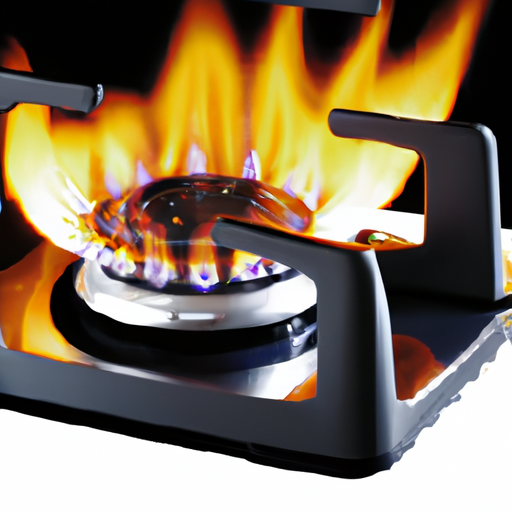Imagine sitting by a crackling campfire on a starry night, surrounded by nature’s serenity, and enjoying a delicious meal cooked on one of many eco-friendly camp stoves. These innovative stoves not only offer a convenient way to prepare your meals outdoors but also contribute to preserving our precious environment. With their low carbon emissions and renewable fuel sources, eco-friendly camp stoves are a game-changer for environmentally conscious adventurers. Say goodbye to traditional stoves and embrace a sustainable way to cook your favorite outdoor feasts.
Overview of Eco-Friendly Camp Stoves
Eco-friendly camp stoves are cooking devices designed to minimize their impact on the environment while providing an efficient and convenient cooking experience in outdoor settings. These stoves are specifically engineered to reduce emissions, use renewable energy sources, and offer versatile fuel options. By choosing an eco-friendly camp stove, you can enjoy the great outdoors without compromising the beauty and sustainability of nature.
Definition of Eco-Friendly Camp Stoves
Eco-friendly camp stoves are cooking appliances that prioritize sustainability and environmental consciousness. Unlike traditional camp stoves that rely on fossil fuels and emit harmful pollutants, eco-friendly camp stoves utilize renewable energy sources or clean-burning technologies. These stoves aim to minimize carbon emissions, reduce waste, and conserve natural resources.
Importance of Eco-Friendly Camp Stoves

Choosing an eco-friendly camp stove is crucial for several reasons. Firstly, these stoves have a significantly reduced carbon footprint compared to their traditional counterparts. By minimizing the emission of greenhouse gases and toxic pollutants, eco-friendly camp stoves help preserve the quality of air and mitigate climate change impacts.
Secondly, eco-friendly camp stoves often utilize renewable energy sources such as solar power, wood, biomass, or alcohol. This reliance on sustainable fuel options reduces our dependency on non-renewable fossil fuels and promotes the use of clean energy.
Furthermore, eco-friendly camp stoves can be cost-effective in the long run. While the initial investment might be higher than traditional stoves, the fuel sources for eco-friendly stoves are often readily available and affordable, saving you money on camping trips or outdoor adventures.
Lastly, eco-friendly camp stoves offer versatility in terms of fuel options. Depending on the type of stove, you can use various fuels such as wood, pellets, solar energy, alcohol, or biomass. This adaptability ensures that you can find the right stove to suit your cooking needs and the availability of fuel in your specific camping location.
Features of Eco-Friendly Camp Stoves
Eco-friendly camp stoves possess several features that make them stand out from traditional camp stoves. These features include:
- Efficient combustion technology: Eco-friendly stoves are designed to burn fuel more efficiently, ensuring minimal waste and better fuel utilization.
- Lightweight and portable: Many eco-friendly camp stoves are lightweight and compact, making them easy to carry and transport during outdoor activities.
- Easy to use: These stoves are user-friendly and often come with simple ignition systems, adjustable flames, and convenient controls.
- Durability: Eco-friendly camp stoves are built to withstand outdoor conditions, ensuring they last for multiple camping trips.
- Safety features: These stoves incorporate safety features such as heat shields, windshields, and flame regulators to prevent accidents and maintain a safe cooking environment.
Types of Eco-Friendly Camp Stoves
There are several types of eco-friendly camp stoves available, each with its unique advantages and features. These include wood-burning camp stoves, solar-powered camp stoves, biomass camp stoves, and alcohol-based camp stoves.
Wood-Burning Camp Stoves
Wood-burning camp stoves rely on burning wood to generate heat for cooking. These stoves are versatile, as wood is usually abundant in camping areas. They are efficient and emit minimal smoke due to innovative combustion technologies and air circulation systems.
Pros of wood-burning camp stoves include their affordability, availability of fuel, and the ability to provide a nostalgic campfire experience. However, they require a steady supply of dry wood, and might not be suitable for areas with fire restrictions or limited wood resources.
Popular wood-burning camp stove models include the BioLite Wood Burning CampStove, Solo Stove Lite, and Emberlit FireAnt Stainless Steel Stove.
Solar-Powered Camp Stoves
Solar-powered camp stoves utilize the energy from the sun to generate heat for cooking. These stoves incorporate solar panels that capture sunlight and convert it into usable energy. They are ideal for sunny camping locations and offer a clean and renewable energy source.
The pros of solar-powered camp stoves include their eco-friendly operation, silent operation, and the ability to charge devices using the integrated solar panels. However, they depend on sunlight availability and may not be suitable for cloudy or shaded areas.
Popular solar-powered camp stove models include the GoSun Sport, Sunflair Portable Solar Oven, and BioLite SolarPanel 10+.
Biomass Camp Stoves
Biomass camp stoves utilize organic materials such as wood pellets, agricultural waste, or dried dung as fuel. These stoves are highly sustainable and make use of waste materials that would otherwise be discarded.
Pros of biomass camp stoves include their versatility in fuel sources, high heat output, and minimal environmental impact. However, they may require specific fuel types that might not be readily available in all camping areas.
Popular biomass camp stove models include the Camp Chef Woodwind WiFi 24, Biolite BaseCamp, and Ohuhu Stainless Steel Wood Burning Stove.
Alcohol-Based Camp Stoves
Alcohol-based camp stoves use fuels like denatured alcohol, methylated spirits, or ethanol for cooking. These stoves are lightweight, easy to use, and provide a consistent heat output. They are ideal for backpackers or minimalistic campers due to their compact size and simplicity.
Pros of alcohol-based camp stoves include their simplicity, wide availability of fuel, and ease of operation. However, they may have a slower cooking time and require additional precautions when handling flammable alcohol.
Popular alcohol-based camp stove models include the Trangia Spirit Burner, Esbit Alcohol Stove, and Solo Stove Alcohol Burner.
Choosing the Right Eco-Friendly Camp Stove

When selecting an eco-friendly camp stove, it’s essential to consider your specific cooking needs, portability requirements, durability, and fuel availability. Here are some factors to consider:
Consideration of Cooking Needs
Determine the type and quantity of meals you plan to cook during your outdoor adventures. Some stoves may be better suited for boiling water and simple meals, while others offer a more versatile cooking experience with adjustable heat settings and larger cooking surfaces.
Portability and Weight
Consider the weight and size of the stove, especially if you plan to backpack or hike long distances. Opt for lightweight and compact models that won’t weigh you down or take up excessive space in your backpack.
Durability and Material
Look for camp stoves made from durable materials such as stainless steel or aluminum. These materials can withstand rugged outdoor conditions and ensure your stove lasts for multiple camping trips.
Fuel Availability and Efficiency
Assess the availability of different fuel options in the areas where you plan to camp. Ensure that the stove you choose can readily utilize the fuel sources you will have access to. Additionally, consider the fuel efficiency of the stove to ensure it maximizes the use of available fuel and minimizes waste.
Wood-Burning Camp Stoves
Wood-burning camp stoves rely on the combustion of wood for cooking purposes. They work by creating a controlled airflow system that allows oxygen to reach the burning wood, producing a consistent flame.
Pros of wood-burning camp stoves include their ability to provide strong heat output, the availability of fuel in most camping areas, and the nostalgic campfire experience they offer. However, they require a steady supply of dry wood, may produce smoke, and need proper fire management to prevent accidents.
Popular wood-burning camp stove models include the Biolite Wood Burning CampStove, Solo Stove Lite, and Emberlit FireAnt Stainless Steel Stove.
Solar-Powered Camp Stoves
Solar-powered camp stoves utilize solar panels to convert sunlight into electricity, which powers the heating element. These stoves are easy to use, emit no smoke, and provide a sustainable cooking option.
Pros of solar-powered camp stoves include their eco-friendly operation, silent operation, and the ability to charge devices using built-in USB ports. However, they are reliant on sunlight availability and might have longer cooking times compared to other stove types.
Popular solar-powered camp stove models include the GoSun Sport, Sunflair Portable Solar Oven, and BioLite SolarPanel 10+.
Biomass Camp Stoves
Biomass camp stoves burn organic materials such as wood pellets, agricultural waste, or dried dung as fuel. These stoves are highly sustainable, utilizing waste materials that would have otherwise been discarded.
Pros of biomass camp stoves include their versatility in fuel sources, high heat output, and minimal environmental impact. However, they may require specific fuel types that might not be readily available in all camping areas.
Popular biomass camp stove models include the Camp Chef Woodwind WiFi 24, Biolite BaseCamp, and Ohuhu Stainless Steel Wood Burning Stove.
Alcohol-Based Camp Stoves
Alcohol-based camp stoves utilize fuels like denatured alcohol, methylated spirits, or ethanol for cooking. These stoves are lightweight, compact, and offer a simple cooking experience.
Pros of alcohol-based camp stoves include their simplicity, wide availability of fuel, and ease of operation. However, they may have a slower cooking time and require additional precautions when handling flammable alcohol.
Popular alcohol-based camp stove models include the Trangia Spirit Burner, Esbit Alcohol Stove, and Solo Stove Alcohol Burner.
Maintenance and Safety Tips for Eco-Friendly Camp Stoves
To ensure the longevity and safe operation of your eco-friendly camp stove, it’s essential to follow proper maintenance and safety practices.
Cleaning and Storage
Regularly clean your camp stove by removing ashes, debris, and food residue. Use a soft brush or cloth to wipe down the surfaces and ensure the stove is free from blockages. Allow the stove to cool completely before storing it in a dry and safe place.
Safety Precautions
Always adhere to safety guidelines provided by the manufacturer. Follow the recommended practices for lighting the stove, regulating flames, and handling hot surfaces. Keep flammable materials away from the stove, and never leave the stove unattended while cooking.
Troubleshooting Common Issues
Incase you encounter any issues while using your eco-friendly camp stove, consult the stove’s user manual for troubleshooting guidance. If the problem persists, reach out to the manufacturer’s customer support for further assistance.
Eco-Friendly Camp Stoves for Different Outdoor Activities
Eco-friendly camp stoves cater to various outdoor activities, ensuring you have a suitable cooking solution regardless of your adventure. Here are some examples:
Backpacking
For backpackers, lightweight and compact camp stoves are essential. Alcohol-based or compact wood-burning stoves are popular choices due to their portability and minimal weight.
Camping
Camping trips often involve larger groups and more elaborate meals. Versatile wood-burning or biomass camp stoves provide the necessary heat output and cooking surface for preparing meals for multiple people.
Hiking
Hikers looking for quick meals or boiling water for hydration can opt for compact and lightweight alcohol-based or solar-powered stoves. These stoves are easy to carry and offer a simple cooking experience.
Survival Situations
In survival situations, having a reliable stove can be a lifeline. Wood-burning stoves are ideal as they can utilize natural resources found in the environment, ensuring a continued fuel source.
Conclusion
Eco-friendly camp stoves are an excellent option for outdoor enthusiasts who want to minimize their environmental impact while enjoying delicious meals in nature. With various types of stoves available, there is a perfect eco-friendly camp stove out there for every camping need. By choosing an eco-friendly alternative, you can contribute to preserving the natural beauty of our planet and reduce your carbon footprint while enjoying the great outdoors.

